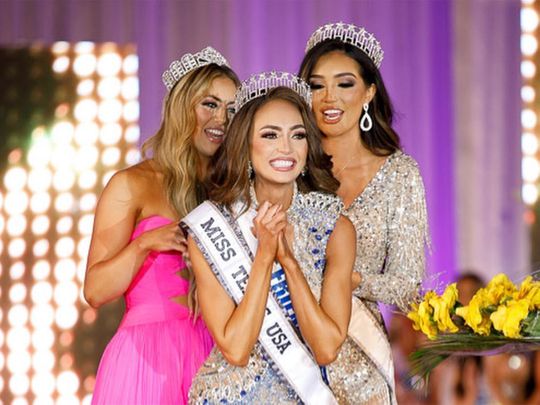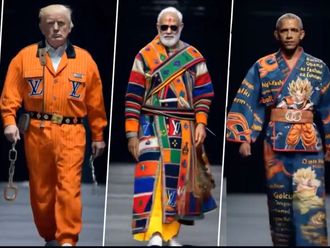
After Miss Texas R’Bonney Gabriel was crowned Miss USA 2022, she walked forward to greet the crowd and then walked back from the runway to the stage. That’s when the other contestants should have greeted her.
Instead of congratulating Gabriel, the first Filipino American to win the pageant, many contestants began leaving the stage.
In the days since the pageant’s final night on October 3, contestants have accused the Miss USA organisation of giving preferential treatment to Gabriel and Miss USA’s umbrella corporation, Miss Brands, run by Crystle Stewart, has been suspended by the Miss Universe Organization.
Miss Brands is being investigated over claims that the pageant outcome was fixed or that the organisation of the contest was favoured for a particular contestant to win, the Miss Universe Organization told The Washington Post.
In a statement to state directors seen by The Washington Post, the Miss Universe group said that Stewart is cooperating with the investigation. Miss Universe operated Miss USA until it was licensed to Stewart in 2020. Now, Miss Universe has taken over Miss USA again.
Stewart did not respond to a request for comments and Miss USA passed on questions to Miss Universe.
After Gabriel was crowned, only the show’s emcees greeted her on the stage, according to Bill Alverson, a lawyer from Alabama who has been a pageant coach for 30 years.
“There was a lack of support from her fellow sister competitors,” said Alverson, who coached seven contestants who lost to Gabriel that night, including the runner-up, Miss North Carolina Morgan Romano.
That was only the first sign that Miss USA, a beauty pageant held since 1952 and not to be confused with the non-profit Miss America pageant, was about to face challenges.
The morning after the competition, Miss Montana Heather O’Keefe posted on TikTok that the pageant was “suspect.”
O’Keefe accused Miss USA of allowing Gabriel perks others weren’t given: being out past curfew during pageant week, being put on sponsors’ social media pages, and a trip to Mexico.
“The girls, including myself, felt disrespected because R’Bonney was very close to the staff members and directors of the pageant, and they were blatant about that.” Miss District of Columbia Faith Maria Porter told The Washington Post. “She also had personal ties with a judge who scored the costume competition, and we can see that she was personally communicating with national sponsors, which is a violation of the contract.”
Gabriel told E! News that she did not receive any preferential treatment. “It was not rigged. I would never enter any pageant that I know I would win,” she said. “I have a lot of integrity.”
Allegations against the pageant continue to fly on TikTok, and O’Keefe has been careful to blame the organisers and not Gabriel.
Gabriel did not respond to requests for comment.
For beauty pageants, most of which are judged subjectively, allegations of preferential treatment are not rare. “The idea that pageant contestants are catty, competitive and out to get each other feeds into a big stereotype in the industry,” said Hilary Levey Friedman, the author of “Here She Is: The Complicated Reign of Beauty Pageants in America.”
Alverson said every competition, no matter how small, has complaints and rumours about rigging.
However, he added, “I have never heard of a pageant with this level of rigging.”
Alverson’s speciality is preparing contestants for the interview round. The coach, who worked with Gabriel’s competitors, suspects that the organisation pre-planned Gabriel’s questions. He said she was treated like “the favoured child of Miss Academy.”
The stakes for a beauty pageant that has been moved off major network TV are low, especially compared with the risk of getting caught cheating. But Friedman said there are a few reasons organisers might want to rig it.
The winner of the competition represents and works for Miss USA for a year. “It’s possible that an organisation would want the winner to be easy to work with, to not have an attitude, to be really savvy at social media,” Friedman said.
Organizations could also be invested in certain winners because of social cache — like the first person of a certain race, she added.
“The only reason you would rig a competition like this is for financial advantage,” Alverson said. If sponsors appear to love a contestant, that could be incentive to push that girl forward, he said.
“There is also a conflict of interest at play,” Friedman said. When Stewart took over Miss USA, she was already heading Miss Academy, a pageant training school in Texas, that coached many of the contestants for Miss USA.
She added that the pageant world is quite insular, and since both Miss USA and Miss Academy are for profit, people did not think it was too unusual that Stewart headed both organisations.
Alverson said Stewart should have divested her ownership of one of the organisations.
This is not the first time Miss USA has been accused of letting its organisers have influence over who would wear the crown. “When former president Donald Trump owned Miss USA, everyone knew that he would pick the favourites,” Friedman said. “This has been the organisation’s historical reputation.”
In the 1980s, judges for Miss USA would hold up their scores for each contestant as she walked by, creating a level of transparency in scoring. The pageant no longer uses that system.
“Moving forward, Miss USA needs to be more transparent about how they are scoring the contestants,” Friedman said. She said that if the organisation does not improve its credibility, the pageant may have fewer interested contestants in the coming years.
“I love pageantry. I think it teaches us confidence and uplifts women,” Porter said. “But it’s hard to have faith in a pageant that shows signs of deep corruption and unethical practices. It’s time pageants evaluate their scoring system.”












